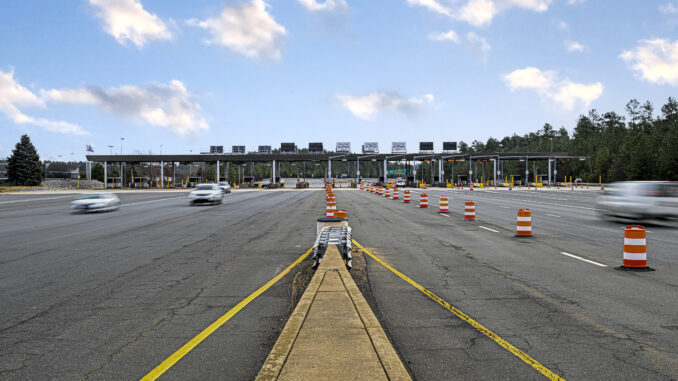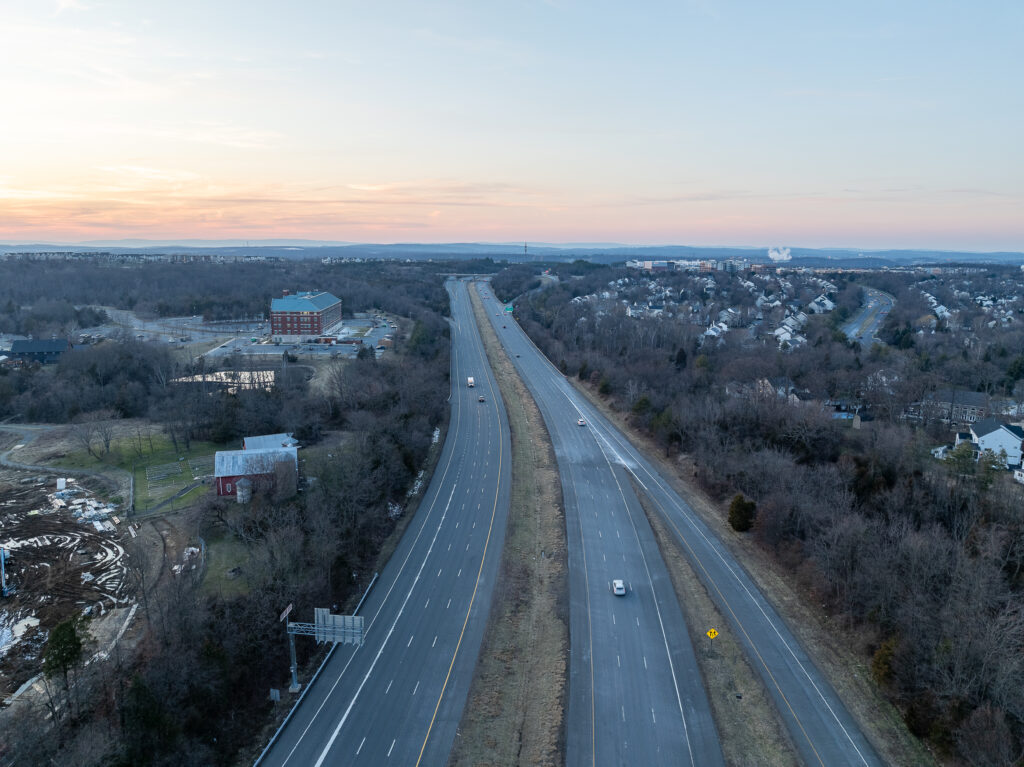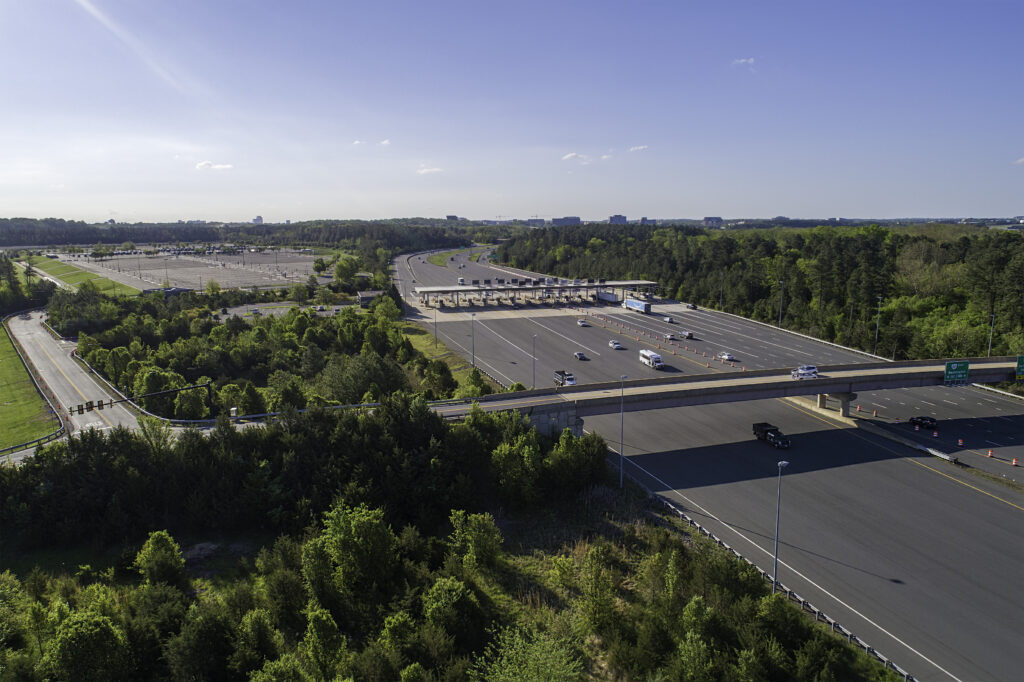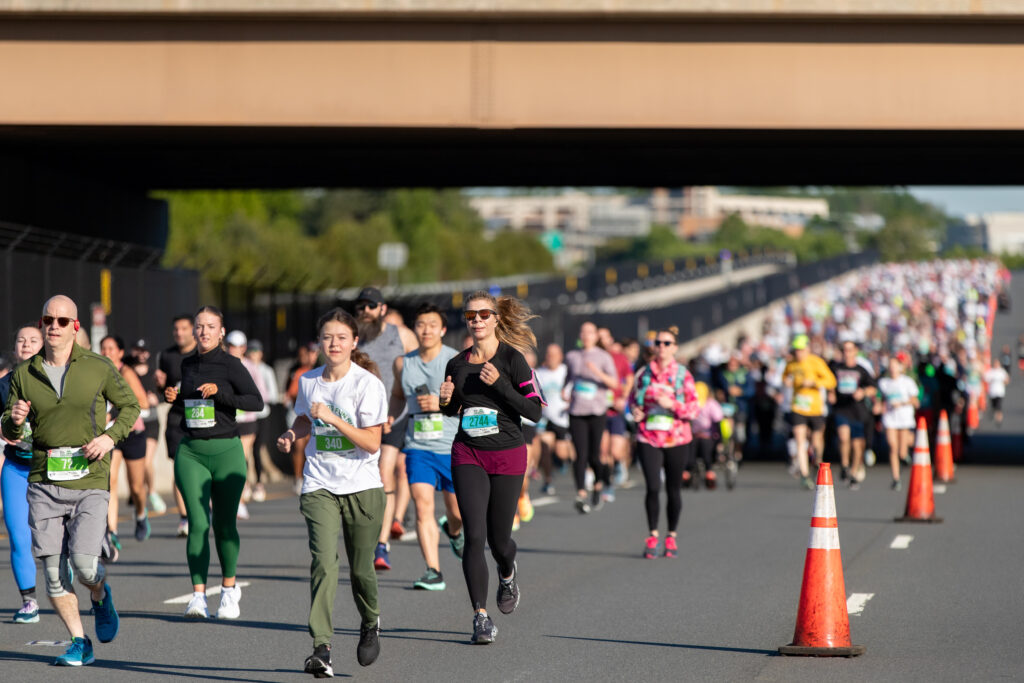
The Road We Love to Hate
By Jonathan Hunley
David and Cindy Mayer don’t have to take the Dulles Greenway as much as they used to.
The Broadlands couple both work for Salesforce in Tysons. Before the COVID-19 pandemic, they were on the toll road – usually in separate cars – at least four to five times a week. They estimate they spent more than $2,000 a year on tolls.
Now, the couple works remotely most days, and they avoid the toll road as much as possible.
“I usually take it on the way to someplace,” Cindy Mayer said. “However, I usually will skip the Greenway on the way home unless I am in a rush.”
She skips the Greenway to avoid tolls that have more than quadrupled since the road opened nearly 30 years ago.
“It’s probably good we have an E-Z Pass, where I don’t always think about the cost of the tolls. If I had to use a credit card or cash every time… it would be a painful reminder of how much it was costing me,” said David Mayer, who estimates the family still uses the Greenway 10 or more times a month. “It’s definitely a love-hate relationship.”
Love and hate. Two sides to the same coin. Love the convenience, the lack of heavy traffic (usually) and how quickly it’s cleared after a (rare) snowfall. But hate the ever-rising tolls — that could go higher still.

HISTORY
The Greenway opened in September 1995. It was largely the brainchild of the late Maggie Bryant of Middleburg. She didn’t want to see development overtake her town, said Greenway spokesman Terry Hoffman, so she figured it would go instead between Dulles International Airport and Leesburg if a road was built there.
She and fellow investors got to work. The $315 million road took four years to build and in the process destroyed 64 acres of wetlands. Bryant, an environmentalist, saw to it that 149 acres of new wetlands were created south of Leesburg to replace them, Hoffman said. She also had the bridge over Goose Creek constructed in such a way that it wouldn’t have any piers that went into the water.
Muhammad Asmat started working at the Greenway as a toll collector way back in June 1995, before the road had even opened. Now, he is in one of the road’s prominent positions – senior operations manager.
The 72-year-old Aldie resident had no toll experience, but he had been in the army in his native Pakistan and was the coach of the national swim team there for 6½ years. After joining the Greenway staff, he was quickly promoted and has been at the Greenway so long that he calls it a home away from home.
Asmat goes out personally to any wreck on the road involving a lane closure – and he boasts that it has never been shut down because of snow.
“We do not close the road, and we take pride in that,” he said.
On Sept. 11, 2001, when westbound traffic on the Greenway was backed up after the terrorist attacks, Asmat gave the instruction to open the gates and allow cars to travel for free.
“To heck with the toll right now,” he recalled saying, figuring that wasn’t the priority at that moment.
The 14-mile highway, which links Dulles International Airport with the town of Leesburg and cuts through the heart of Ashburn, is owned by a company called Atlas Arteria, based in Melbourne, Australia, and operated by Toll Road Investors Partnership II, also known as TRIP II.
When the Greenway opened, the toll was $1.75. It went down to $1 the next year when traffic didn’t meet projections but has steadily gone up since.
Because the Greenway is a private entity that serves a public purpose, its tolls are regulated by Virginia’s State Corporation Commission.
The Greenway operators are currently seeking SCC approval to raise tolls from $5.25 during off-peak hours and $5.80 at peak times to $6.40 off-peak and $8.10 at peak hours. The increase is necessary to help the operation pay off its debts, which total more than a billion dollars, according to a July filing to the SCC.
Greenway spokesman Terry Hoffman said that rate increases would also “help us operate the road on a day-to-day basis.” For example, asphalt prices, as well as the cost of snow removal, have increased due to inflation, and the Greenway must foot these bills itself because the road is privately owned and not under the authority of the Virginia Department of Transportation.
“Everything’s gone up,” Hoffman said.
He also noted that the Greenway has to pay the Metropolitan Washington Airports Authority for an easement to use the land that the road is on, as well as pay real estate taxes to Loudoun County. The Greenway is one of the largest real estate taxpayers in the county. The road is valued at roughly $199 million; last year, TRIP II paid more than $1.8 million in taxes, according to county officials.

The toll debate
Legislation has been filed in the Virginia General Assembly the past three years that would have changed the way tolls were set, but those bills have failed to win approval.
Opponents of Greenway toll increases say the legislation would not necessarily have meant lower rates, or distance-based pricing, which would determine toll prices depending on how far a motorist drove on the road. Currently, drivers pay one price to use the Greenway no matter how far they go on it.
The legislation, sponsored last year by state Sen. Dave Marsden, D-Fairfax, and Dels. David Reid, D-Loudoun, and Michael Webert, R-Fauquier, would have allowed the state commissioner of highways, the secretary of transportation and the Transportation Public-Private Partnership Steering Committee to negotiate a new toll agreement with the Greenway under the Public-Private Transportation Act.
Reid, who is running for the Democratic nomination for Virginia’s 10th Congressional District seat, filed a similar bill in this year’s General Assembly session, but it died in the House Appropriations Committee. Following that defeat, the lawmaker said he would seek to have the bill’s language incorporated into the state budget. But that looked to be a tough task and would go against General Assembly norms.
Reid said the legislation would reduce tolls by 25% and implement distance-based pricing.
“It’s time to work toward long-term, meaningful toll reductions to provide cost of living relief to the people of Loudoun County and [Virginia’s 10th Congressional District] who rely on the road for their businesses and families,” the lawmaker said in a statement in January announcing the original bill’s filing.
The idea of distance-based pricing is one that the Mayers are definitely up for.
“If you are traveling from Loudoun County Parkway to the main toll plaza, should that cost the same as from Leesburg to the main toll plaza,” Mayer asked. “A $7 toll from Leesburg and a $1.50 toll from Loudoun County Parkway would be a lot easier to deal with. I would use the Greenway more if I was only paying for the distance I traveled.”
The Loudoun County Board of Supervisors, however, opposed Reid’s bill. Dulles District Supervisor Matthew F. Letourneau, a Republican, said a gubernatorial administration essentially would have carte blanche to negotiate any deal it wanted under the new arrangement without getting approval from the General Assembly or the supervisors.
Nothing prevents the Greenway from adding distance-based tolling now, Letourneau said. He pointed out that the highway would be profitable if not for debt service.
“Clearly, they’re struggling,” he added.
Former Loudoun Del. David Ramadan, who has opposed toll increases for years, recalled that former Rep. Frank Wolf, R-10th District, called the Greenway tolls literal “highway robbery.”
He said Reid’s legislation this year would have meant the government bailing out the Greenway from failed financial decisions.
“This was a bailout bill,” he said.
As the SCC nears a decision on the Greenway latest rate increase, Letourneau and Ramadan are putting their faith in 2021 legislation that provides new criteria the SCC must use to judge a proposed hike.
Under the bills sponsored by state Sen. John Bell, D-Loudoun, who has retired, and Del. Suhas Subramanyam, a Democrat who was elected to Bell’s former seat in November, proposed rates must be reasonable to drivers in relation to the benefit obtained, not likely to materially discourage use of the roadway and provide the Greenway no more than a reasonable return.
Subramanyam, who also seeks his party’s nomination in the 10th District, filed another bill this year that would give the SCC the explicit authority to lower tolls if it finds the charges are discouraging use of the Greenway, or that the road is overcharging users.
“The commission must lower tolls if they’re not reasonable,” the senator said last month.
The SCC held a public hearing on the proposed toll increases Jan. 9 at Freedom High School in South Riding, and has also received written comments.
Among the comments, Yasin Gedik of Ashburn wrote that the Greenway should use distance-based pricing instead of the current practice of charging one rate no matter how much of the highway a driver uses. “This road is very expensive already,” Gedik wrote.
Ashburn resident Anu Koda commented, as well. She uses the Greenway only occasionally – for example, when she’s running late for an appointment. “I drive an extra 10 [minutes] to avoid this toll,” she wrote. “Any increase is more reason to avoid this road completely.”
Michelle Steelman and her husband commute, and the Ashburn residents are against the proposed hike, too.
“We feel the toll now is high enough,” Michelle Steelman wrote. “Traveling on the road each day, any price increase will become a hardship. We will need to go another way if the toll raises.”
The SCC’s staff recommended denial of this year’s requested toll increases, writing in a report that “current toll rates could be interpreted as no longer being reasonable relative to the benefits offered” by using the Greenway.
The SCC was scheduled to hear evidence in the case Feb. 28 through March 1. A decision on the increases was anticipated sometime after that.
Whatever the outcome, the Mayers will continue to use the Greenway judiciously. It’s there when they need it, but they are open to alternatives.
“I definitely have friends that refuse to use the Greenway,” David Mayer said. “They will take Route 7 all the way to Tysons. Now, that takes a lot longer, but they refuse to pay the tolls.”
Jonathan Hunley is a career journalist and a lifelong Virginian who has written for publications around the state.
FIVE FAST FACTS ABOUT THE DULLES GREENWAY
- The Dulles Greenway eliminated toll collectors in March 2020 because the road stopped accepting cash payments during the pandemic. It now only takes credit cards and E-ZPass.
- At the height of the Greenway’s use of toll-takers, there were 136 collectors, and 26 worked at a time.
- The busiest day ever on the Greenway was June 15, 2005. A total of 81,346 vehicles used the road that day.
- The busiest days on the Greenway now generally are Tuesdays through Thursdays. The road sees an average of 37,000 or 38,000 cars per day.
- The fastest speed someone has received a ticket for on the Greenway was 120 mph.
SOURCES: Terry Hoffman, public and customer relations manager for the Dulles Greenway; Muhammad Asmat, senior operations manager for the Greenway
GREENWAY GIVES BACK
While most people think of the Greenway as simply a road, like many businesses, it is actually involved in several other initiatives.
For example, in 2005, the Greenway’s wetlands preserve, now managed by the Loudoun Wildlife Conservancy, became home to two bald eagles, and in 2021, two cameras were installed so that viewers can watch the birds and their offspring on a livestream on the Greenway’s website (dullesgreenway.com/eagle-cam).
The Greenway also has engaged with the community by contributing more than $4 million to Loudoun County charities over the years.
The roadway’s main fundraising event is its annual “Run the Greenway” race. The event’s third annual incarnation was held last May and welcomed nearly 2,000 runners for 5K, 10K, kids fun run and virtual races. The event raised more than $268,000 for 17 local nonprofits. Over the past three years, Run the Greenway has raised more than $644,000.
The event replaced an earlier effort in which the Greenway donated money from tolls on one particular day to local nonprofits.

